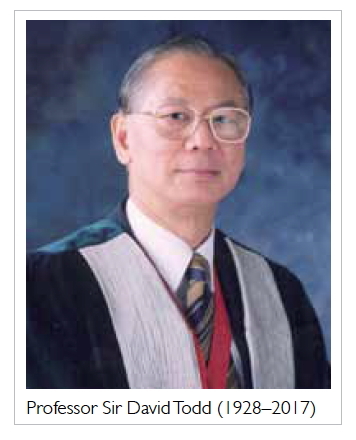DOI: 10.12809/hkmj175073
© Hong Kong Academy of Medicine. CC BY-NC-ND 4.0
OBITUARY
Professor Sir David Todd
CS Lau
President, Hong Kong Academy of Medicine
Professor Sir David Todd, Founding President of the
Academy, passed away peacefully after a brief illness on 16 August 2017 at
Queen Mary Hospital—where his medical education matured and exceptional
career achievement endured. He was taken care of by those he had taught
and surrounded by his family, beloved students and mentees.
Widely revered by the medical profession in Hong
Kong and internationally for his achievements in medical education and
research, Sir David also had an unassailable reputation for his selfless
dedication to patient care and numerous community services.
Sir David was instrumental in the establishment of
the Hong Kong Academy of Medicine (HKAM). He was Chairman of the HKAM
Preparatory Committee from 1990 to 1992 and served the Academy as her
founding President between 1992 and 1996. After stepping down from his
Presidency, Sir David continued to give support to the Academy Council and
offered advice. To honour his contribution, the Executive Board of the
HKAM Foundation Fund proposed in 1995 to organise an Oration in the name
of Sir David to be held annually at the Academy. In 1997, Sir David was
further elected an Honorary Fellow of the Academy.
Professor Todd, as many of us used to fondly call
him, was regarded a formidable and caring teacher and mentor by his
students and colleagues and commanded tremendous respect from the medical
community in Hong Kong.
“There is more to a good medical and dental
practitioner than the ability to pass examinations: compassion and wisdom
must be added to expertise.” He once wrote in the foreword of the
Academy’s Tenth Anniversary Commemorative Book.
In his 2014 speech at the first dinner gathering
organised for Council members and Past Presidents to meet with
distinguished Young Fellows, Prof Todd said:
You are a specially gifted group and with this come obligations. These
include being leaders in preventing and treating disease, carrying out
research to advance health care, sharing your knowledge with colleagues,
especially those who follow in your footsteps, educating the public and
placing service before self-interest. In other words honour
professionalism, and be role models. Some of your work can be done through
the Academy and its Colleges and I hope you will actively contribute to
their endeavours.
Hong Kong is going through difficult times. You face more challenges than we did in the past. But Hong Kong has survived and thrived. The medical profession traditionally shies away from politics but we may no longer be able to do so. Come what may the integrity of our profession must be maintained. I trust you can strike a balance between idealism and reality. Einstein said “Life is like riding a bicycle. To keep your balance you must keep moving”. So do keep moving in the right direction and uphold the profession. . . . . .
Hong Kong is going through difficult times. You face more challenges than we did in the past. But Hong Kong has survived and thrived. The medical profession traditionally shies away from politics but we may no longer be able to do so. Come what may the integrity of our profession must be maintained. I trust you can strike a balance between idealism and reality. Einstein said “Life is like riding a bicycle. To keep your balance you must keep moving”. So do keep moving in the right direction and uphold the profession. . . . . .
Besides his work in the Academy, he had contributed
immensely to the development and growth of medicine in the city and
beyond. He was Head of the University of Hong Kong Department of Medicine
from 1974 to 1989, Founding President of the Hong Kong College of
Physicians in 1986, and a member of the first Hospital Authority Board in
1990. He was also Chairman of the AIDS Trust Fund, Chairman of the Health
Services Research Committee, Vice-Chairman of the S.K. Yee Medical
Foundation, and Trustee of the Croucher Foundation and the Sino-British
Fellowship Trust.
Prof Todd also emphasised the importance of
research in medical education and training, commenting that “it focuses
the mind, increases analytical powers, and contributes to improvements in
health and patient care.” Between 1986 and 1993, Prof Todd served on the
University and Polytechnic Grants Committee and was the first Chairman of
its Research Grants Committee.
Sir David had received numerous local and overseas
College Fellowships and awards over the years with the Carl de Grouchy
Medal awarded by the Haematology Society of Australia in 1979 among the
most notable ones. For his services to medicine and education in Hong
Kong, he was awarded an Officer (OBE), a Commander (CBE), and Knight
Bachelor of the Most Excellent Order of the British Empire in 1982, 1990,
and 1995, respectively.
Sir David has left behind a legacy of love,
respect, leadership and, most importantly, humanism. He will be always
remembered by his family, friends, colleagues, students, and staff.


